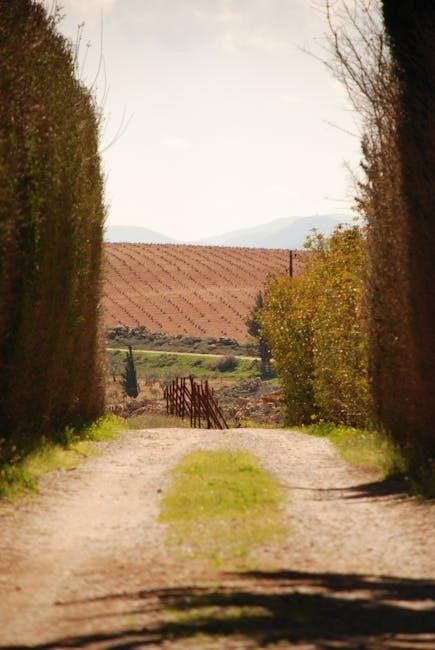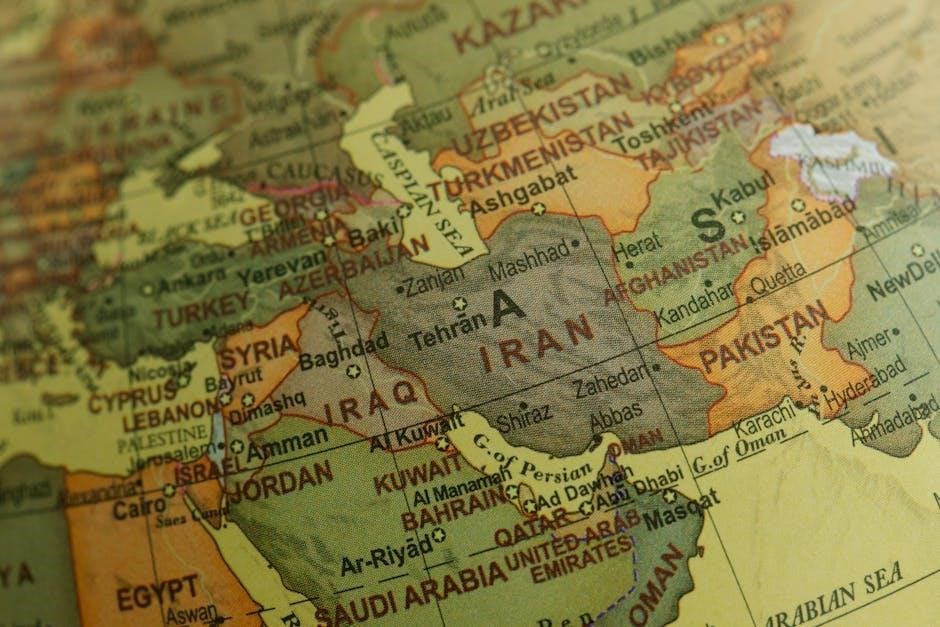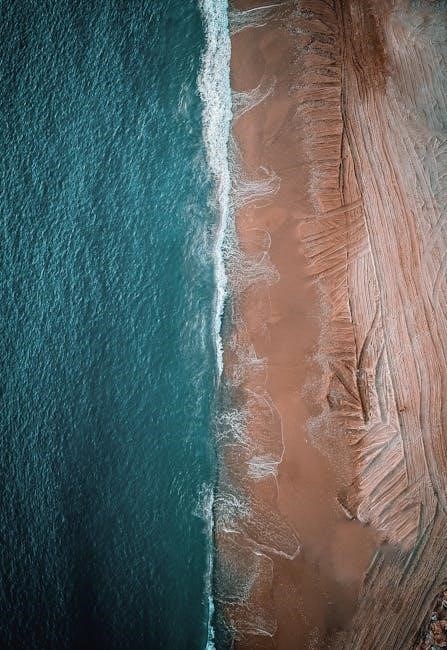lebanon guide
Lebanon, located in the Middle East, offers a rich blend of history, culture, and natural beauty, from ancient ruins to vibrant cities and stunning Mediterranean landscapes.
Overview of Lebanon’s Geography and Climate
Lebanon, a small country in the Middle East, boasts a diverse geography. Its landscape features the Lebanon Mountains, which dominate the interior, and the Anti-Lebanon Mountains along the eastern border. The narrow coastal plain along the Mediterranean Sea gives way to fertile valleys, including the Bekaa Valley, a key agricultural region. Lebanon’s climate is Mediterranean, with cool, wet winters and hot, dry summers. Spring and autumn are mild, making them ideal for outdoor activities. The country’s geography supports a wide range of ecosystems, from snow-capped peaks to lush forests and arid deserts, contributing to its natural beauty and biodiversity.
Cultural and Historical Significance
Lebanon is a treasure trove of history and culture, with roots tracing back to ancient civilizations like the Phoenicians, Romans, and Ottomans. Its cities, such as Byblos, Sidon, and Tyre, are UNESCO World Heritage Sites, showcasing archaeological wonders. The country’s cultural identity is a vibrant blend of Arab and Mediterranean influences, reflected in its cuisine, music, and festivals. Religion plays a significant role, with a diverse population of Muslims and Christians coexisting harmoniously. Lebanon’s historical legacy and cultural richness make it a unique destination, offering insights into millennia of human history and a resilient, family-oriented society that values tradition and modernity alike.
Safety and Travel Advisories
Lebanon faces security concerns, with advisories against non-essential travel due to risks like crime, terrorism, and civil unrest. Stay alert, avoid unexploded ordnance, and follow local guidance.
Current Travel Warnings and Restrictions
Several governments, including the UK and Australia, currently advise against all but essential travel to Lebanon due to heightened risks of crime, terrorism, and civil unrest. The FCDO specifically warns about the volatile security situation, which could deteriorate rapidly. Travelers are urged to avoid areas near the Lebanon-Israel border and Syrian border regions due to ongoing tensions and the presence of unexploded landmines. Additionally, there are concerns about kidnapping and armed conflict. While some countries, like the UAE, have eased travel restrictions for their citizens, the overall advisory remains cautious. Stay informed and register with your government’s travel advisory program for updates.
Security Concerns and Regional Risks
Lebanon faces significant security challenges, including terrorism, armed conflict, and civil unrest. The presence of armed groups near borders with Israel and Syria elevates risks, with frequent reports of skirmishes and tensions. Unexploded landmines in border areas pose additional dangers. Petty and violent crime rates are high, particularly in urban centers like Beirut. Kidnapping incidents, often targeting foreigners, highlight the need for heightened vigilance. Political instability and economic crises exacerbate these risks, making the security situation unpredictable. Travelers must remain alert, avoid demonstrations, and steer clear of areas near conflict zones to minimize exposure to potential threats.
Essential Safety Tips for Travelers
Travelers to Lebanon should remain vigilant due to the volatile security situation. Avoid traveling near border areas with Israel and Syria, as tensions and conflicts are frequent. Stay informed about local conditions and demonstrations, as they can escalate quickly. Keep travel documents easily accessible and ensure they are up to date. Avoid touching unknown objects, especially in rural or off-road areas, due to the risk of unexploded landmines. Use reputable transportation services and avoid displaying signs of wealth. Stay alert in crowded areas to prevent petty theft or scams. Always follow local advice and avoid traveling at night when possible.

Best Time to Visit Lebanon
Lebanon’s best visiting seasons are spring (March–May) and autumn (September–October), offering mild weather perfect for hiking and sightseeing. Summer can be extremely hot, while winter is cool.
Seasonal Weather Patterns
Lebanon experiences a Mediterranean climate, characterized by hot, dry summers and cool, wet winters. Spring (March–May) brings mild temperatures, ideal for hiking, while autumn (September–October) offers pleasant weather. Summer (June–August) is humid and hot, especially in coastal areas, with temperatures often exceeding 30°C. Winters (December–February) are cool, with occasional rain and snow in mountainous regions. The weather varies significantly between the coast and mountains, making the country’s climate diverse and seasonal changes distinct. This variability makes spring and autumn the most favorable periods for outdoor activities and sightseeing.
Optimal Seasons for Hiking and Sightseeing
Spring (March–May) and autumn (September–October) are the best seasons for hiking and sightseeing in Lebanon. Mild temperatures and lush landscapes make these periods ideal for exploring nature reserves and historical sites. Summer’s heat can be challenging, especially in coastal areas, while winters may bring rain and snow, limiting access to mountain trails. The pleasant weather during spring and autumn allows visitors to fully enjoy Lebanon’s diverse natural beauty, from the cedar forests to the Mediterranean coastline, making these seasons the peak times for outdoor activities and cultural exploration.

Cultural Insights and Etiquette
Lebanon’s cultural diversity, rich history, and religious tolerance create a vibrant society. Understanding local customs and social norms enhances travelers’ experiences.
Understanding Lebanese Customs and Traditions
Lebanese culture is deeply rooted in hospitality and respect for elders. Greetings often involve handshakes or kisses on the cheek, with “Marhaba” (Hello) or “Ahlan” (Welcome) commonly used.
Dining etiquette emphasizes sharing meals and not refusing food offered, as it signifies respect. Hands should be washed before eating, and food is traditionally eaten with the right hand.
Religious diversity is prevalent, with both Islamic and Christian traditions influencing daily life. Visitors should dress modestly, especially when visiting religious sites, and show respect during prayers or ceremonies.
Religious Diversity and Social Norms
Lebanon is a mosaic of religions, with 18 recognized sects, including various Christian denominations, Sunni and Shia Muslims, and Druze. This diversity fosters a unique coexistence, though tensions can arise.
Social norms lean toward conservatism, especially in rural areas, where traditional values are upheld. However, Beirut and other urban centers are more liberal, reflecting Lebanon’s blend of Eastern and Western influences.
Visitors should respect cultural and religious practices, particularly when visiting mosques or churches, by dressing modestly and avoiding public displays of affection.

Major Tourist Attractions
Lebanon boasts ancient ruins like Byblos and Tyre, stunning natural landscapes, and vibrant cities, offering a mix of history, culture, and breathtaking Mediterranean views for visitors.
Historical and Archaeological Sites
Lebanon is a treasure trove of ancient history, with sites like Byblos, a UNESCO World Heritage city, showcasing Phoenician, Roman, and medieval ruins. The Temple of Jupiter in Baalbek, another UNESCO site, highlights Roman architectural brilliance. Tyre, with its well-preserved Roman baths and Hippodrome, offers a glimpse into Lebanon’s rich past. These sites, along with the stunning Jeita Grotto, reveal the country’s diverse historical legacy, blending Phoenician, Roman, and Ottoman influences into a fascinating cultural tapestry that attracts history enthusiasts and travelers worldwide.
Natural Landscapes and Beaches
Lebanon boasts a diverse natural landscape, from the golden sands of its Mediterranean beaches to the rugged beauty of its mountain ranges. The scenic Qadisha Valley, with its deep gorges and lush forests, is a haven for hikers. The Jeita Grotto, a stunning limestone cave, is a natural wonder that attracts visitors worldwide. Coastal towns like Byblos and Tyre offer charming beaches, while the snow-capped peaks of Mount Lebanon provide a picturesque backdrop for winter sports. These natural treasures make Lebanon a destination for both beachgoers and nature enthusiasts, offering a mix of relaxation and adventure in a breathtaking setting.

Accommodation and Where to Stay
Lebanon offers a variety of accommodations, from luxury hotels in Beirut to charming guesthouses in historic towns like Byblos and cozy mountain retreats in the countryside.
Popular Areas for Tourists
Lebanon offers a variety of vibrant areas for tourists to explore. Mar Mikhael and Gemmayze are known for their trendy bars, restaurants, and artistic vibe. Hamra is a hub for shopping and dining, while Badaro provides a quieter, local atmosphere with charming cafes. Downtown Beirut is a must-visit, blending modern architecture with historical sites like the Martyrs’ Square. These areas are perfect for experiencing Lebanon’s dynamic culture, rich history, and lively nightlife, making them ideal bases for travelers.
Hotel and Lodging Recommendations
Lebanon offers a wide range of accommodations to suit all budgets and preferences. In Beirut, popular areas like Mar Mikhael and Gemmayze feature trendy boutique hotels and vibrant vibes. The Smallville Hotel and Hotel Albergo are highly recommended for their modern amenities and central locations. For a luxurious stay, consider the Four Seasons Hotel Beirut or Le Gray Beirut, which offer stunning views of the city and Mediterranean. Budget-friendly options include guesthouses and hostels, especially in areas like Hamra and Badaro. Booking in advance is advised, especially during peak travel seasons.
Practical Travel Tips
Stay informed about local conditions, keep travel documents secure, and avoid off-road travel. Respect cultural norms, plan efficiently, and remain vigilant for a smooth experience in Lebanon.
Transportation and Getting Around
Lebanon offers various transportation options, including taxis, ride-hailing apps like Uber, and public buses. Renting a car is ideal for exploring rural areas but requires caution due to challenging road conditions. Walking and cycling are feasible in cities like Beirut, though traffic can be chaotic. Always use reputable taxi services and keep your travel documents easily accessible. Avoid traveling off main roads and stay alert in crowded areas. Planning ahead and staying informed about local conditions will help ensure a smooth journey.
Essential Items to Pack
Pack lightweight, breathable clothing for Lebanon’s warm summers and layers for cooler winters. Include comfortable walking shoes or hiking boots for outdoor adventures. Bring sunscreen, a hat, and sunglasses for sun protection. A reusable water bottle is handy for staying hydrated. Carry a secure bag or money belt for valuables and ensure travel documents are up to date. Include a first-aid kit and personal medications. For cultural visits, pack modest clothing and a scarf for religious sites. Don’t forget adapters for charging electronic devices and a portable charger for convenience.


